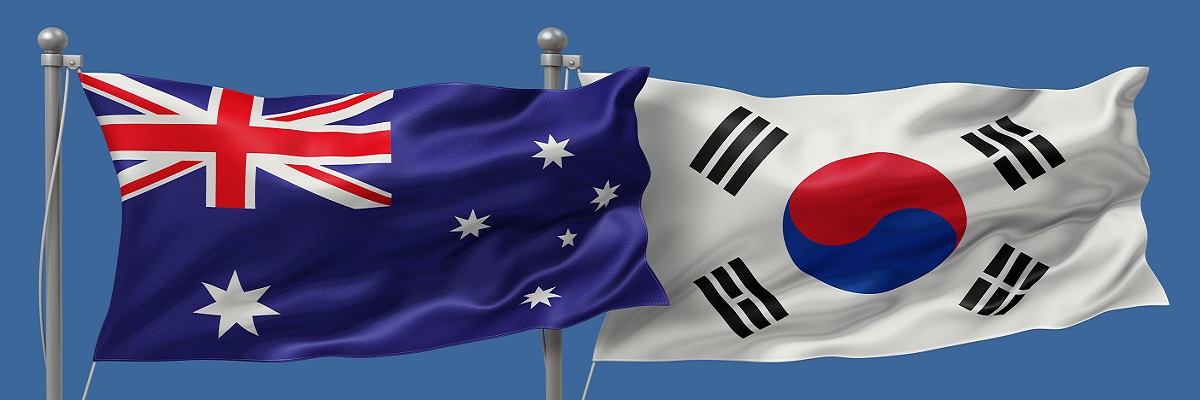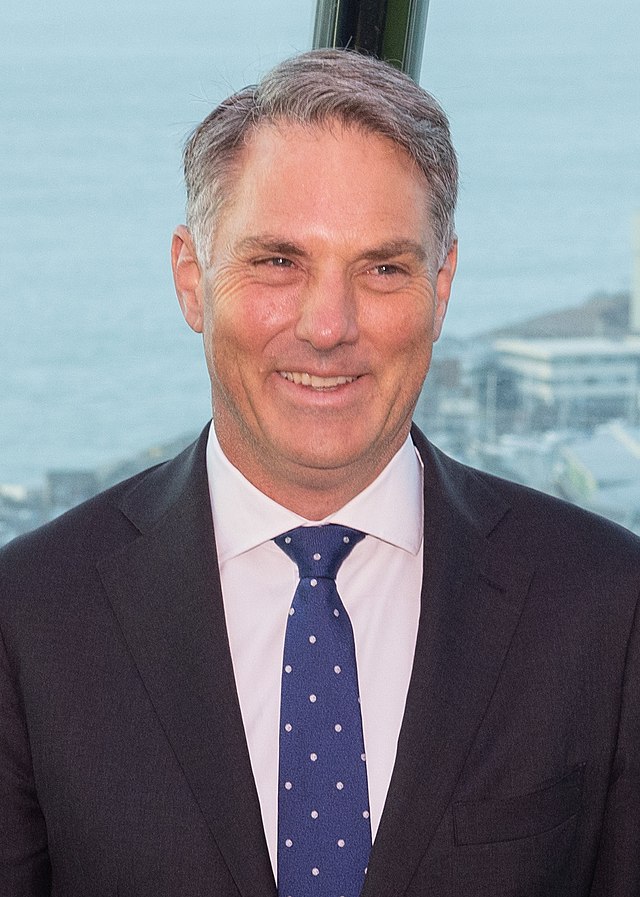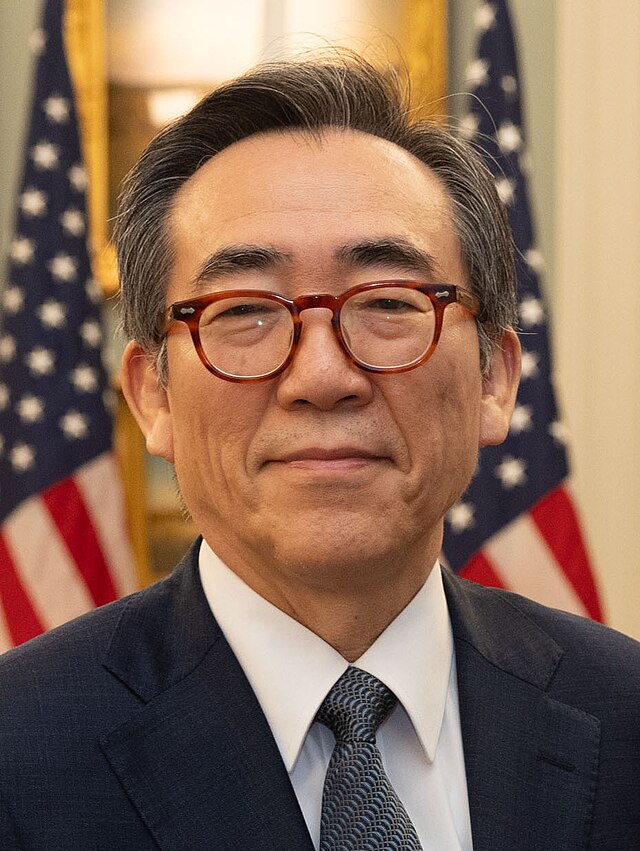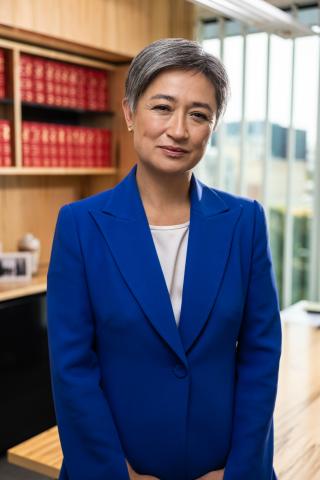Defense & Security
Press Conference, Melbourne. Australia-Republic of Korea 2+2 Foreign And Defence Ministers’ Meeting

Image Source : Shutterstock
Subscribe to our weekly newsletters for free
If you want to subscribe to World & New World Newsletter, please enter
your e-mail
Defense & Security

Image Source : Shutterstock
First Published in: Jan.05,2024
May.27, 2024
Joint transcript with: The Hon Richard Marles MP, Deputy Prime Minister and Minister for Defence Subjects: Australia-Republic of Korea 2+2 Foreign And Defence Ministers’ Meeting; AUKUS Pillar Two; Hanwha bid for Austal; foreign interference; Korean peninsula security. 01 May 2024 Deputy Prime Minister, Richard Marles: Well, welcome everyone. Today, the Minister for Foreign Affairs and I have had the pleasure of being able to welcome Minister Cho and Minister Shin, the Foreign Minister and the Defense Minister of South Korea to a 2+2 with Australia. In December of 2022, the Republic of Korea released its Indo-Pacific Strategy. And it described an assessment of the region and a response to it, which represented Korea looking to take its place in the region and the world. That is remarkably similar to the assessment that we made a few months later in the Defence Strategic Review. And it speaks to the fact that both Korea and Australia have a close strategic alignment and a shared vision about our place in the region and the world. And what was immediately obvious from that moment was the opportunity to take the relationship between our two countries to the next level. And today's 2+2 is very much an expression of that. We are seeing increased engagement between our two countries across the board. We are certainly seeing that in the realm of defence. Last year, Korea had its largest participation in Exercise Talisman Sabre, which is our major bilateral defence exercise. This year, we will see more Korean engagement in Exercise Pitch Black, Exercise Kakadu, Exercise Southern Jackaroo and we are very appreciative of Korea’s participation in those exercises, as we are in the way in which Korea and Australia are working together to uphold the rules-based order within our region and in fact, within the world. Both countries, as we've discussed today, are playing our part in supporting Ukraine in its resistance of the appalling aggression that is being forced upon it by Russia. We are working very closely together within our region to uphold the global rules-based order here as well, and that's seen in a greater engagement that both of us are doing with the countries of the Pacific and the countries of southeast Asia. We are particularly aware of the efforts that have been put in place for Korea to build its relationship with Japan and we see this as a very, very positive step forward in the strategic landscape of the region, and represents a huge opportunity for Australia to engage with both Korea and Japan. Finally, in respect of defence industry, we are seeing a blossoming of the relationship between our two countries in respect of defence industry. Yesterday, Minister Shin and I visited Hanwha's facility in Geelong, which is building for the Australian Army both the Huntsman and the Redback, which will be very central to our capabilities for the Army. But we're also very hopeful that these platforms represent an opportunity for greater industrial activity there, where we can see export to the world. Across the board, this is a relationship which is going to a new place, a place which is much deeper and much closer and we are very, very grateful for the presence of Minister Cho and Minister Shin in Australia today and we've really enjoyed the meeting that we've had this morning. Republic of Korea Minister of Foreign Affairs, Cho Tae-Yul: [spoken in Korean] Good afternoon, ladies and gentleman. I am Cho Tae-Yul, Minister of Foreign Affairs of the Republic of Korea. I am grateful for the successful organisation of the sixth Republic of Korea-Australia 2+2 Foreign and Defence Minister’s Meeting and I extend my deepest thanks to Mr Richard Marles and Ms Penny Wong for the warm welcome toward our delegations. It is with great pleasure that I make my first visit as Minister of Foreign Affairs to Australia to, our esteemed regional partner. Together with Mr Shin Won-sik, Minister of National Defense. During the first day of our visit on the 29th of April we paid tribute to the enduring legacy of 17,000 Australian veterans at the Australian National Museum Korean War Memorial in Canberra, commemorating their profound sacrifices for peace. The sacrifices of Australian veterans have laid a solid foundation for the prosperity of our relationship and on behalf of the Korean Government and people, I’d like to express heartfelt gratidude to the Australian veterans for their unwavering dedication. Today’s meeting holds significant importance as it is the first gathering of its kind following the installation of our current governments and Korea’s announcement of our Indo-Pacific Strategy. This occasion is further distinguished by its location in Melbourne, a symbol of our robust cooperation in defence industry. The Ministers of the two countries engaged in extensive discussions aimed at deepening strategic cooperation and communication, reinforcing our shared vision at both regional and global levels. Both parties recognise each other as pivotal partners in the realisation of our respective Indo-Pacific strategies, and as likeminded nations agreed to enhance our cooperation at bilateral, unilateral and multilateral levels. We acknowledge the remarkable progress in our bilateral cooperation with national defence and defence industries, highlighted by the signing of a contract for the delivery of Redback IFVs and the participation of Korean military personnel in Exercise Talisman Sabre and we said that we will be strengthening our cooperation into the future. In the realms of cyber and maritime security, we agreed to collaborate in blocking North Korea’s access to funding for illicit nuclear and missile developments, and to thwart illegal activities such as arms trading between Russia and North Korea. Our Australian counterparts have expressed their steadfast support for enhancing the human rights of North Koreans and for our policies aimed at reunification. Furthermore, we resolved to continue our close collaboration with ASEAN and the Pacific regions which hold great significance for both our countries. We will also expand our cooperative efforts for comprehensive security in cyber and maritime security, as well as economic security and climate change. I am confident today’s meeting will mark a significant milestone in strengthening our partnership built on the shared foundations of liberal democracy and mutual trust, and will further our commitment to a rules-based regional and global order. Foreign Minister, Senator Penny Wong: Thank you very much. Can I first express my deep appreciation to Minister Cho and Defense Minister Shin for their travel to Australia for this Foreign and Defence Ministers’ 2+2 meeting. We appreciate you coming to Australia and we have deeply enjoyed the dialogue this morning. This is the first 2+2 for us Ministers. We recognise that this dialogue is a cornerstone of our comprehensive strategic partnership with Korea. Can I start by appreciating the Minister's acknowledgement of the role that Australia and Australian veterans have played in this bilateral relationship. We thank you for honouring those Australians who have served. It is a testament to the historic strength of our relationship. But more importantly, today, what we focus on is the increasing strategic and economic convergence that exists between our two nations. And the focus of our meeting was how to translate that convergence that the Deputy Prime Minister and Foreign Minister Cho have articulated, how we translate that convergence into tangible and practical actions in southeast Asia, in the Pacific and more broadly in terms of our cooperation in in the Indo-Pacific. We are very interested not only in increasing our cooperation and our engagement in defence industries, but also in increasing our collaboration diplomatically and economically. I make note, as Foreign Minister Cho did, of our collective condemnation of North Korea's continue provocative, destabilising activities and we will continue to work together to ensure that this risk and threat to our collective security continues to be met in solidarity between our countries and other countries of the world. As you will see from the joint statement when it is released, discussed a range of other matters, including the Middle East, where we shared our perspectives. I thank, again, my counterpart, the Foreign Minister for his engagement. We were an early call for him and we appreciate it. And we appreciate the efforts that the Ministers have made in coming to Australia for this very important 2+2. Republic of Korea Minister of National Defense, Shin Won-Sik: [spoken in Korean] Good afternoon, I am Shin Won-sik, Minister of National Defense of the Republic of Korea. First of all, I would like to express my deepest appreciation to Mr Richard Marles, Deputy Prime Minister and Ms Penny Wong, Minister of Foreign Affairs for the warm reception of our delegations. We are externally grateful for the noble sacrifices made by the 17,000 Australians during the Korean War who fought for freedom and peace in our country. On behalf of our people, thank you. During the ROK-Australia Foreign and Defence Ministers’ Meeting we engaged in extensive discussions on a range of issues concerning the Korean peninsula, Indo-Pacific region and boarder global foreign affairs and defence matters and reaffirmed our commitment to further develop our bilateral future oriented relationships. Firstly, we agreed to continue enhancing our mutual and beneficial partnership in defence industry. It is with great pleasure that I know a Korean company was selected in Australia’s next generation Infantry Fighting Vehicle project, valued at $250 million USD. This follows the successful collaboration on the self-propelled artillery project in 2021. Yesterday, the Deputy Prime Minister, Mr Marles, and I visited the construction site of a Korean company in Geelong where we witnessed firsthand our flourishing bilateral cooperation in the defence industry. This collaboration is set to not only modernise Australia’s military capabilities, but also stimulate the local economy and strengthen the strategic solidarity between our nations. Secondly, we agreed to enhance our joint military training to improve interoperability and foster conditions for regional peace and stability. Last year, a significant contingent of Korean armed forces participated in Exercise Talisman Sabre, yielding fruitful outcomes. This year, the Australian military took part in Korea’s Freedom Shield exercises, as a member of United Nations command, enhancing its capabilities for joint operations. We are committed to continuing these joint exercises in various forms and further elevating the level of cooperation between our armed forces. Thirdly, recognising the importance of building trust in our national defence and defence industry partnership, we agreed to expand human exchanges among defence related organisations. Republic of Korea and Australia, as key strategic partners in the Indo-Pacific region, share profound strategic views and interests. We will build on the achievements of today’s meeting and collaborate earnestly for the peace and stability of the Korean peninsula, Indo-Pacific region and the international community as a whole. Speaker: Questions? Journalist: South Korean Minister for National Defence, Shin Won-sik, there's been speculation about countries like South Korea joining the AUKUS Defence technology. Did you discuss this today? And does South Korea believe that it could engage in useful cooperation under Pillar Two of AUKUS? And Minister Marles, Hanwha has made a bid for Austal. Was this big discussion discussed in your meetings over recent days? And would such a bid likely be permitted under the new foreign investment framework being unveiled by the government today? Defence Minister Shin: [spoken in Korean] The Korean government, to enhance the regional peace, we support the AUKUS Pillar Two activities, and we do welcome that AUKUS members are considering Korea as the AUKUS Pillar Two partner. Korea's defence science and technology capabilities will contribute to the peace and stability of the development of AUKUS Pillar Two and the regional peace. And during today's meeting, we also discussed the possibility of partnering with AUKUS Pillar Two. Thank you. Deputy Prime Minister Marles: So, perhaps I might address both issues in relation to AUKUS Pillar Two. And we did discuss this both yesterday and today. AUKUS, as you know, is a technology-sharing agreement. It's not a security alliance. And Korea is obviously a country with deeply impressive technology, where we do have shared values, where we have strategic alignment, where we engage closely together. We already engage closely together in relation to technology. So, as AUKUS Pillar Two develops, I think there will be opportunities in the future, and we're seeing that play out in relation to Japan as well and we talked about that. In respect of Austal. Look, ultimately, this is a matter for Austal. They are a private company. From the government's perspective, we don't have any concern about Hanwha moving in this direction. We have identified Austal as a strategic shipbuilder for Australia in WA. Wherever Austal goes, whatever it does, there will obviously need to be security arrangements put in place in respect of sensitive technologies and intellectual property that would have to be managed no matter what the future of Austal. And were there anything that were to transpire in relation to Hanwa that would need to be managed in that context as well. But fundamentally, this is a matter for Austal as a private company. Journalist: And to Foreign Minister Wong. Australian officials have confirmed that India’s government was behind the nest of spies the Director General of Security described in 2021. Should Australians in the diaspora community be concerned about Indian government surveillance? And what message does the Australian government have to the Indian government about the acceptability of these activities and to Foreign Affairs Minister Cho Tae-Yul, the ABC has today reported South Korea is one of the friendly countries with a good relationship with Australia, which nonetheless engages in espionage here. Has there ever been a point of tension between the two countries, or are there clear shared understandings about the operation of intelligence agents in both countries? Foreign Minister Wong: Well, you would be unsurprised to hear me respond that we don't comment on intelligence matters. But at a level of principle about the democracy, I think you would have heard me and other Ministers on many occasions assert the importance of our democratic principles, assert the importance of ensuring that we maintain the resilience of our democracy, including in the face of any suggestion of foreign interference, and we have laws to deal with that. And to continue to say that we deeply value the multicultural fabric of the Australian community. It is a strength and we welcome people's continued engagement in our democracy. Foreign Minister Cho: [spoken in Korean] In regards to your question, I haven't heard anything and I am not sure against which context you are asking this question, so I have nothing to answer to that question. Journalist: Thank you. Minister Cho, you've both spoken today about the tensions across the Korean peninsula. These aren't always discussed when we're talking about issues like defence arrangements in the Pacific and the AUKUS deal as such. Why do you believe that close-knit ties with Australia in defence and these types of engagement is something that does have an impact on that relationship? Foreign Minister Cho: [spoken in Korean] Korea's security focuses on the North Korea's threat, but it's not the only focus. But as you can see, there's huge geopolitical changes taking place and the security in the Indo-Pacific region is closely linked to the security of other regions of the globe. So, we live in such a geopolitical era and Russia and North Korea are cooperating in the Ukraine war. And it shows that the Indo-Pacific region’s security is closely linked to the security of Europe as well. So, Korea's security is closely linked with Australia's security, and that's the world we live in. So, against the context of Indo-Pacific region and from the regional point of view, Australia and Korea share a lot of values and it's very good, not only in terms of economy, but also in security for our two countries to cooperate. So, in that context, we discussed the security partnerships between our two countries. Foreign Minister Wong: I might just add to that, if I may, Richard, that I think history shows us that what happens in the Korean peninsula matters to the security and stability of our region. We have no doubt that North Korea's destabilising, provocative, escalatory actions are contrary, are a threat to international peace and security, as well as to the peace and security of the ROK. We see it as very important that the international community exert and assert as much pressure as possible on the DPRK, including in relation to the regime of sanctions. And as Foreign Minister Cho has said, the actions of Russia in undermining that - those sanctions, in undermining the isolation of the DPRK, in participating in the provision of materiel, in contravention of UN resolutions and sanctions, is destabilising and undermines peace and security for the whole of the globe. And so I think it is important for us to continue not only to express solidarity with the Republic of Korea in the face of this aggression but also to call out Russia's behaviour as irresponsible and destabilising. Journalist: And Minister Wong, you touched on the reports of espionage before - Foreign Minister Wong: No, I was asked about them and I said we don't comment on intelligence matters. Journalist: Sure, I understand that that's the general principle on these matters, but given Australia's close-knit ties with India in the situation of the Quad, as a general principle, could I ask you, do you believe Australia would feel empowered enough to be forthright in raising concerns of these nations with the Indian government if they did it right? Foreign Minister Wong: Well, again, say we don't comment on intelligence matters, but as a matter of general principles, Australia remains consistent to our interests and to our values in all of our engagements. Speaker: Great. Thank you very much.
First published in :

Australian Deputy Prime Minister. Picure credit: Department of Foreign Affairs. Public domain: https://commons.wikimedia.org/wiki/File:Richard_Marles_in_Feb_2023.jpg

Republic of Korea Minister of Foreign Affairs. Picture credit: U.S. Department of State from United States. Public domain: https://commons.wikimedia.org/wiki/File:Cho_Tae-yul,_Republic_of_Korea_Foreign_Minister_at_the_Department_of_State_in_Washington,_D.C._on_February_28,_2024_(cropped).jpg

Australian Foreign Minister, Senator. Picture credit: Department of Foreign Affairs and Trade website – www.dfat.gov.au
Unlock articles by signing up or logging in.
Become a member for unrestricted reading!